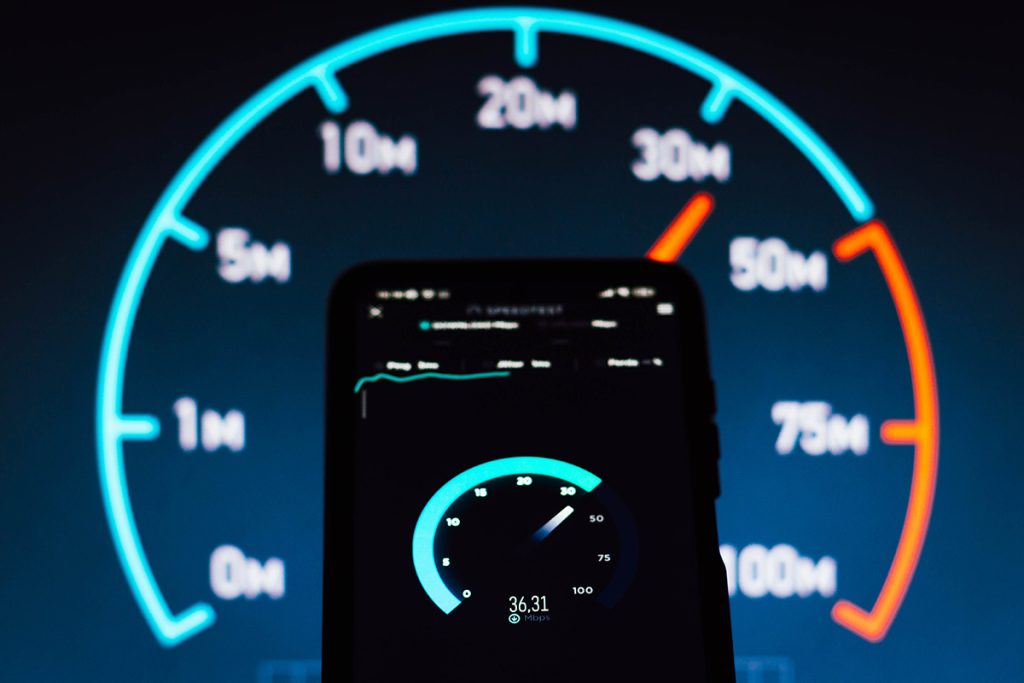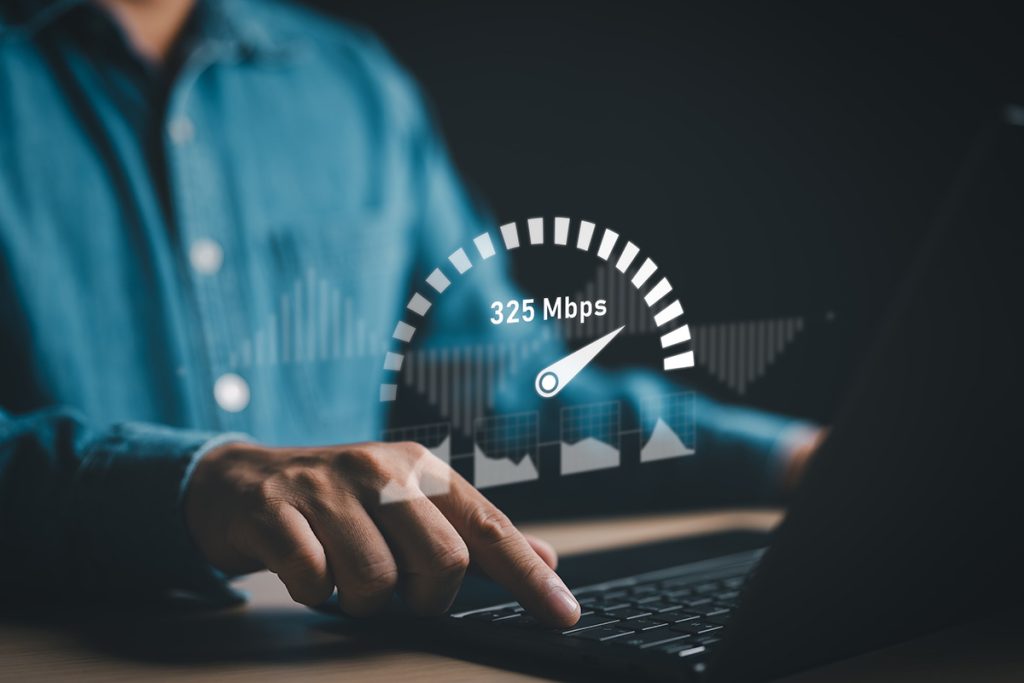Whether you’re a gamer, student, office worker, or couch-dwelling Netflix connoisseur, a speedy internet connection is crucial. Should you get stuck with a substandard connection speed, you’ll sacrifice productivity, suffer from buffering, and may die a gruesome in-game death.
Running an internet speed test lets you analyse your connection and determine whether it aligns with your Internet Service Provider’s (ISP) claims. With this information, it may be possible to optimise your network performance.
Understanding Internet Speed Tests
All WiFi speed tests analyse the same three metrics: download speeds, upload speeds, and ping/latency.
Download speed measures how rapidly you can receive data from the Internet onto your device. Most ISPs (and users) prioritise download speed, as it’s crucial for web browsing, streaming, and online gaming.
Upload speed refers to how quickly you can send data from your device onto the internet. This opposite-flowing traffic is handy for creating live streams, making video calls, and uploading files to email attachments or online platforms like Facebook and DropBox. As we tend to upload far less data than we download, most internet plans have comparatively slow upload speeds.
Finally, a speed test also measures latency, AKA ping. Latency determines how rapidly a data request can travel towards a server and back. Should it take more than a couple of seconds, you’ll notice a delayed response time. In the gaming world, this delay is known as lag, and it’s as frustrating as it is deadly. Many competitive gamers prioritise ping above all else.

Choosing a Reliable Speed Test Tool
You’ll find a myriad of wireless internet speed tests online. Some reputable tests include Speedtest by Ookla, Fast.com, TestMy.net, and Speedof.Me. The big search engines like Google and Bing automatically display their own speed testing apps when you type relevant terms such as “check internet speed.”
Many ISPs offer their own speed tests, though these aren’t quite as reliable. Your ISP could optimise the connection between your network and their servers, thus exaggerating the results. Stick to third-party providers instead of a Telstra speed test.
Preparing for the Test
A little pre-test preparation removes bandwidth bottlenecks and leads to more accurate results.
Pause any ongoing downloads, such as software updates, torrents, or Xbox games, and switch off your TV streaming services. Close any unnecessary applications that could consume data in the background and disconnect other devices from your WiFi network. For optimal accuracy, bypass the WiFi altogether and plug your PC directly into the router via an Ethernet cable. Log out of your VPN, if you have one, and run the speed test at an off-peak time.
All these steps will improve your internet connection to provide a more accurate result. But maybe you want to know your connection speed with and without a VPN, or during peak versus non-peak times. In that case, simply run the test twice and compare the results.
Running the Speed Test
The speed tests we’ve recommended are super simple to use. Just click “Go,” “Start,” “Run speed test,” or another start-related synonym. The platform will evaluate your connection in less than a minute.
Results vary slightly between different speed testing platforms as each uses unique methods to analyse your connection. Furthermore, results can vary from one moment to the next as internet congestion fluctuates. Nonetheless, you should see similar and relatively consistent results over various different tests.
Interpreting the Results
We measure download and upload speeds in megabits per second, known as Mbps (sometimes Mbit/s or Mb/s). This measurement represents the transfer of 1 million bits each second, which is approximately enough data to store a small photo. Be careful not to confuse megabits with megabytes (MB), which are eight times larger. Therefore, a 1 Mbps connection will take eight seconds to transfer 1 MB of data.
So what constitutes a decent internet speed?
It depends on what you want to do. The following chart outlines the recommended internet speed for a single user performing one specific activity.
| Activity | Recommended internet speed |
| Checking emails and messages | 1 Mbps |
| Web browsing | 5-10 Mbps |
| Checking social media, including reels | 10 Mbps |
| Making video calls | 10-20 Mbps |
| HD streaming | 10-20 Mbps |
| Online gaming | 20-30 Mbps |
| 4K streaming | 30-40 Mbps |
It’s possible to do all these activities with a slower internet speed, albeit with buffering and lag.
Conversely, if multiple users in the same home or office network are performing these activities simultaneously, you’ll want to multiply your connection speed. A data-hungry family could need a connection of 100 Mbps or more.

Troubleshooting Slow Speeds
Here’s a list of different factors that can affect your download/upload speed and how to fix them.
| Factor | How to fix it |
| Current downloads | Pause or cancel the download |
| Bandwidth-hogging apps running in the background | Uninstall or pause the app |
| Other devices leeching bandwidth | Disconnect other devices from your WiFi |
| A slow WiFi connection | Get a faster WiFi card or use an Ethernet cable |
| Malware on your device | Update your anti-virus software and run a full system scan |
| Obstructions like walls between your device and router | Position your device closer to your router or use an Ethernet cable |
| Big distances between your device and router | Setup a WiFi extender or use an Ethernet cable |
| An active VPN | Turn off your VPN |
| A saturated (high-traffic) network | Use the internet at off-peak times or sign up with a better ISP |
| A slow or out-dated router | Purchase and install a better router |
Verifying Your ISP’s Claims
Wondering whether your ISP is as speedy as they say?
Follow all the tips in the above troubleshooting section and run a few different speed tests. If your speed is consistently and significantly lower than your ISP’s advertised speed, you could be getting a raw deal.
Consider calling your ISP to ask for an explanation or switching to another provider.
Optimising Your Home or Office Network
If you need help optimising your home or office network, get in touch with Geeks2U today. Our expert Geeks offer high-quality network support and troubleshooting services directly to your doorstep.
FAQ
-
What is an internet speed test, and why should I run one?
An internet speed test measures your connection’s download and upload speeds. Run one to ensure you’re getting the speeds you’re paying for.
-
How do I run an internet speed test on my computer or mobile device?
Use an online tool like Ookla or Fast.com, click “Start Test,” and wait for the results.
-
What do the results of an internet speed test mean?
The results show your download speed, upload speed, and ping, which reflect your internet connection’s performance.
-
What factors can affect the accuracy of my internet speed test?
Factors like network congestion, distance from the router, and device performance can impact test accuracy.
-
How often should I run an internet speed test?
Run a test periodically, especially if you notice slow internet speeds or after changing your service plan.
Related services
Wi-Fi setup
Our expert Geeks can help you to setup and troubleshoot your home Wi-Fi. From slow speeds to security issues, our expert technicians can get you back up and running in no time.
Laptop repairs
Whatever the brand, whatever the issue, there’ll be an expert technician desperate to get their Geek on and get your laptop back up and running.
Data backup and transfer
Our friendly experts are here to help you with everything from transferring data to a new phone or PC to setting up backup strategies tailored to your needs.
or complete our form today to set up an appointment with a computer repair technician




